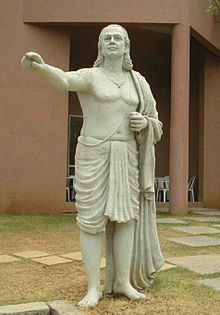Aryabhata
Indian mathematician-astronomer
Aryabhata (476–550 CE) was an Indian mathematician and an astronomer. He discovered zero.[3]
Āryabhaṭa | |
|---|---|
 | |
| Born | 476 CE |
| Died | 550 CE[2] |
| Academic background | |
| Influences | Surya Siddhanta |
| Academic work | |
| Era | Gupta era |
| Main interests | Mathematics, astronomy |
| Notable works | Āryabhaṭīya, Arya-siddhanta |
| Notable ideas | Explanation of lunar eclipse and solar eclipse, rotation of Earth on its axis, reflection of light by moon, sinusoidal functions, solution of single variable quadratic equation, value of π correct to 4 decimal places, diameter of Earth, calculation of the length of sidereal year |
| Influenced | Lalla, Bhaskara I, Brahmagupta, Varahamihira |
References
change- ↑ Bhau Daji (1865). "Brief Notes on the Age and Authenticity of the Works of Aryabhata, Varahamihira, Brahmagupta, Bhattotpala, and Bhaskaracharya". Journal of the Royal Asiatic Society of Great Britain and Ireland. pp. 392–406.
- ↑ Chad (2013-11-24). "Aryabhata Biography - Life of Indian Astronomer". Totally History. Retrieved 2022-12-14.
- ↑ "Aryabhata".
Wikimedia Commons has media related to Aryabhata.